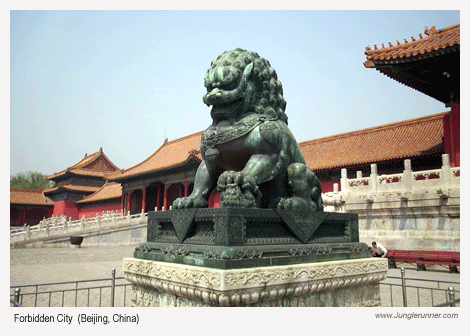
#37 - Beijing
Jeff
Willner - 19 April 2002
(Beijing,
CHINA) � Reading the Lonely Planet prior to visiting
China is a daunting experience... Facts for the Visitor: Travelers
should be aware of the following diseases they may pick up while
visiting China:
Cholera, Diptheria, Hepatitis, Japanese B Encephalitis, Polio, Rabies, Tuberculosis,
Typhoid, Malaria, Altitude sickness, Fungal infections, Heatstroke, Hypothermia,
Prickly heat, Upper respiratory tract infections, Amoebic dysentery, Giardiasis,
Intestinal worms, Schistosomiasis, Bedbug/Tick infection, Dengue fever, Filariasis,
Leishmaniasis, and Typhus. Also watch for unsanitary toilets, robbers with
knives on trains, crime, noise, pollution, and uncontrolled spitting. Population
growth, untrammelled industrialisation and poor resource management have had
devastating effects on the environment. And the Chinese have invaded and currently
occupy Tibet. In short I had the full western set of preconceived notions about
the world's most populous and enigmatic country, I assumed it was a third-world,
oppressive regime.
It was with some foreboding that I landed in Beijing. We piled into
a van to drive to Tianjin, several hours east, to get our Chinese drivers
licenses but there was a problem at the station. All applicants must
pass a computerized driving test - in Chinese. Sally and I looked at
each other then at the officials. In Chinese? No problem, money changed
hands and pretty soon we were seated in front of two computer terminals
in a deserted testing room. Multiple choice questions would pop up
in pictographs and the supervisor standing behind us would lean forward
and mutter, "Number 3 Mr. Jeff. Number 1 Miss. Sally." Needless
to say, we passed with flying colors (Sally's 99 trumped my 98). Arriving
late in the port city of Tangu we referred to our guide book and selected
an inexpensive hotel where we ran headlong into the two curses that
would plague us for the rest of the trip - filthy carpets with spit
all over them (vacuum cleaners don't seem to exist), and bathrooms
that go beyond the definition of filthy (imagine a public toilet in
constant use being flushed once a day with a bucket of water). We went
next door to get some food and were overcharged for some bland fare
in a filthy (have I used that word too many times) restaurant. And
stopping into the Sailor's Club for a drink found to our consternation
that it was a hostess club. By the time I went to bed I was dreading
the next month. Four weeks of this?
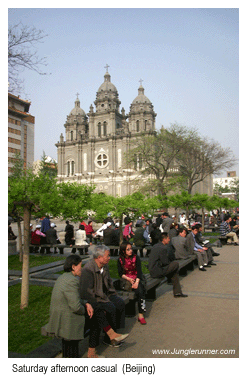 My
first intimation that China was something different was on the drive
into Beijing after our three day struggle to free the Land Rover from
the port authorities. Highways. Four lane, computerized toll card,
swept median, signs in English highways. Well there was certainly enough
hype in the press about China's booming economy (11% annual growth
for the last decade according to the gov't figures) so they should
be able to afford a couple of highways. But Beijing was yet another
eye opener. Since the city successfully bid for the 2008 Olympics,
coal cooking fires were being replaced with natural gas and the air
quality was pretty decent. Orderly streets, parks, thriving stores,
and plenty of western chain restaurants lent the impression of being
in a European city (though the Chinese signs brought me back to reality
pretty quick). Even so, I was guarded. This was the capitol. Of course
things would be better.
My
first intimation that China was something different was on the drive
into Beijing after our three day struggle to free the Land Rover from
the port authorities. Highways. Four lane, computerized toll card,
swept median, signs in English highways. Well there was certainly enough
hype in the press about China's booming economy (11% annual growth
for the last decade according to the gov't figures) so they should
be able to afford a couple of highways. But Beijing was yet another
eye opener. Since the city successfully bid for the 2008 Olympics,
coal cooking fires were being replaced with natural gas and the air
quality was pretty decent. Orderly streets, parks, thriving stores,
and plenty of western chain restaurants lent the impression of being
in a European city (though the Chinese signs brought me back to reality
pretty quick). Even so, I was guarded. This was the capitol. Of course
things would be better.
It's About the Kids
It was the Chinese children that really made me stop and reconsider my entire
perspective. A lot has been made of the inhumane government policy of limiting
family size and I will not even attempt to justify the means, but the result
has been vital to China's future. You see, what I noticed was that virtually
every child had at least one or two adults in attendance. They were well
dressed, loved, and coddled. And according to a Chinese friend all that attention
turned into high expectations when they hit school. "You may have noticed" he
said, "at university in the US when many of the rest of the students
went out to have fun the Chinese students are still studying to get perfect
marks and this is because their parents, their wife's parents, their grandparents
on both sides - everyone is pushing them to be a success." I did notice.
Tao was a Chinese student in my cohort at Wharton, very likable but seldom
at the parties - and he finished with a perfect GPA. Hat's off to you Tao,
now I understand.
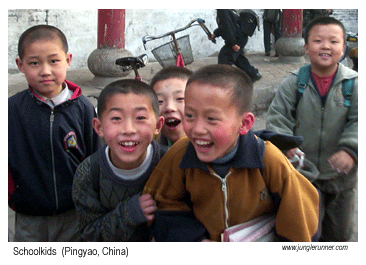 All
right the children are loved and well educated, 'so what' you may say.
The 'so what' is in population growth, China is 0.88% per year. To
quote professor Pack from school, any country with a population growth
rate above 1% a year has no chance of investing in the infrastructure
necessary to support economic growth, the budget is consumed by healthcare,
education, and housing - that is if there is a decent budget to begin
with. Africa is a prime example. Countries like Kenya with a 3.5% population
growth rate into the '90s (the highest in the world) can't even keep
up with demographic demands never mind infrastructure investment (though
population growth is only one of a myriad of problems that has crippled
Kenya). Take away population control and away go most of the new highways,
pipelines, train tracks, and ports. Think India (1.55% growth rate).
All
right the children are loved and well educated, 'so what' you may say.
The 'so what' is in population growth, China is 0.88% per year. To
quote professor Pack from school, any country with a population growth
rate above 1% a year has no chance of investing in the infrastructure
necessary to support economic growth, the budget is consumed by healthcare,
education, and housing - that is if there is a decent budget to begin
with. Africa is a prime example. Countries like Kenya with a 3.5% population
growth rate into the '90s (the highest in the world) can't even keep
up with demographic demands never mind infrastructure investment (though
population growth is only one of a myriad of problems that has crippled
Kenya). Take away population control and away go most of the new highways,
pipelines, train tracks, and ports. Think India (1.55% growth rate).
And the Chinese kids are polite. In many of the towns in western China
we were some of the first white people they had seen so a crowd formed
pretty quickly, yet almost every time when I bought some extra candy
from a street vendor and tried to hand it out they would politely decline.
That hasn't happened to me before. I thought maybe it was the lack
of showers but our guide set me straight, "They are too polite
to take it you see." Wow. Educated, nurtured, proud, polite, happy
- I was very impressed with the kids. In the vernacular of emerging
economies research, several factors have emerged as statistically significant
contributors to fast economic growth and one of the biggest is literacy.
China: 99%. India: 74%. Add it all up and you have a very impressive
set of future citizens. I began to realize that China's emergence as
a world power might be for real despite the terrible toilets.
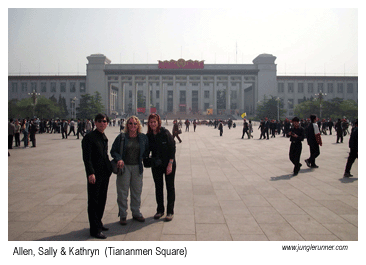 70%
Right, 30% Wrong
70%
Right, 30% Wrong
Our first night in Beijing we hopped a cab to Tiananmen Square to see the heart
of the city. It was pushing 9pm by the time we got out of our Beijing Opera
performance but we figured there was still time to walk the famous square.
Sally, Kathryn and I walked through the underground street crossings to cross
Beijing's six and eight lane thoroughfares and arrived at the square. Deserted
in the dark. Cool. We hopped over the shin high chain barrier and started walking
past the building that houses Mao's preserved corpse. "Look at the soldiers," said
Kathryn, "I think they are on parade." A line of six soldiers marched
precisely in the distance. We noticed guards at attention near the central
monument and others scattered around the 'Mao'soleum. "Umm, are they coming
toward us?", Sal asked. "Oh they are just changing the guards" I
said breezily. The lead soldier in the line of troops called an order and the
six headed directly at us. We realized at that moment that the largest square
in Beijing was completely empty of any non-military personnel. "Crap!
It's closed. We are going to be anti-democracyd! Run for it." The three
of us waved as stupidly as we could manage (don't blame us we are idiots),
ran for the chain fence waded across the six lane road and stopped to breathe
on the opposite sidewalk. Nice way to start the tour of Beijing. "Yeah," said
Sally, "but now I really want to see that 'Mao'soleum."
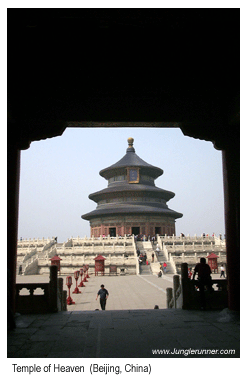 Even
the official communist literature admits that Mao made mistakes in
his rule of China, the party line is that he was 70% right and 30%
wrong. I figured out the wrong parts; the purges of intellectuals,
the Great Leap Forward (where Mao forced millions back to the farm
with inspirational slogans to grow food for the country - resulted
in a famine that claimed 30-60 million lives), and the Cultural Revolution
(where thousands of suspected anti-Mao people were imprisoned or killed).
But I was hard pressed to understand why he was still so beloved by
the population. What was the 70% right? To find the answer you must
go back two centuries.
Even
the official communist literature admits that Mao made mistakes in
his rule of China, the party line is that he was 70% right and 30%
wrong. I figured out the wrong parts; the purges of intellectuals,
the Great Leap Forward (where Mao forced millions back to the farm
with inspirational slogans to grow food for the country - resulted
in a famine that claimed 30-60 million lives), and the Cultural Revolution
(where thousands of suspected anti-Mao people were imprisoned or killed).
But I was hard pressed to understand why he was still so beloved by
the population. What was the 70% right? To find the answer you must
go back two centuries.
In the late 18th century the Qing (pronounced Ching) Dynasty had grudgingly
accepted commercial relations with Britain and other Western countries
though trade was confined to the port of Guangzhou, and foreign merchants
were required to conduct trade through a limited number of Chinese
merchants. Initially, the balance of trade was in China's favour, as
Britain and other countries paid for huge quantities of tea not with
British goods but with money in the form of silver. Seeking to level
the balance of trade, the British merchants during the 1780's introduced
Indian opium to China. Addiction spread and soon the balance of trade
had shifted in favour of Britain - even though trade in opium was illegal
in China. By the 1830's the problem of opium addiction, increasingly
corrupt officials, and the outflow of silver was becoming a problem
for the Qing and they appointed a senior official to shut down the
trade. Using this as a pretext, the British government sent 42 warships
to blockade Chinese ports and force the government to sign the Treaty
of Nanjing. This opened five ports to foreign trade and residence and
established large areas known as concessions that were leased in perpetuity
to foreign powers. In 1856-60, Britain aided by France renewed hostilities
in the second Opium War to secure even more favourable trading advantages.
By the 1860s there were 14 treaty ports. Because the foreigners had
demanded the right to impose their own laws instead of obeying Chinese
laws, the concessions, especially those in Shanghai, came to resemble
international cities. Foreigners in China sold imported manufactured
goods that competed with Chinese products, but the treaties prohibited
China from setting tariffs to protect its industries. (Microsoft
Encarta Reference Library 2002)
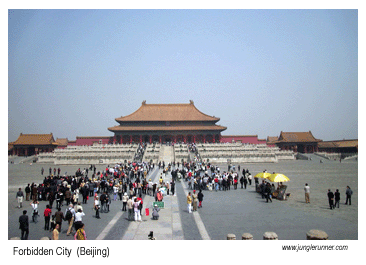 It
was unfortunate that during this critical time in China's history the
emperors of the Qing Dynasty were of mediocre calibre, and in fact
were completely out of touch with anything happening outside of the
Forbidden City. Most real power was exercised by the eunuchs who surrounded
the emperor, and from 1875 to 1908 the Dowager Empress, Cixi, was the
power behind the throne. She resisted any attempt to reform the ancient
institutions of the empire because she was worried about undermining
her power base, so China was ill-equipped to deal with aggressive western
powers. Gradually China lost it's colonial holdings, Vietnam, Cambodia
and Laos to France, Britain occupied Burma, Japan forced China out
of Korea and made them cede Taiwan, Germany and Russia demanded and
received mineral and railway construction rights.
It
was unfortunate that during this critical time in China's history the
emperors of the Qing Dynasty were of mediocre calibre, and in fact
were completely out of touch with anything happening outside of the
Forbidden City. Most real power was exercised by the eunuchs who surrounded
the emperor, and from 1875 to 1908 the Dowager Empress, Cixi, was the
power behind the throne. She resisted any attempt to reform the ancient
institutions of the empire because she was worried about undermining
her power base, so China was ill-equipped to deal with aggressive western
powers. Gradually China lost it's colonial holdings, Vietnam, Cambodia
and Laos to France, Britain occupied Burma, Japan forced China out
of Korea and made them cede Taiwan, Germany and Russia demanded and
received mineral and railway construction rights.
It was almost inevitable that after so many humiliations, internal
resentment would lead to a drive to overthrow the Qing Dynasty and
in 1911 after several uprisings the last emperor abdicated the throne.
It was over. China would be split into rival factions, dominated by
regional warlords for decades, invaded by Japan and pushed around by
western powers through two world wars, until finally Mao Zedong captured
the hearts of the masses and unified the country in an epic struggle.
On October 1, 1949, Mao proclaimed the establishment of the People�s
Republic of China from the emperor's platform of the Forbidden City
to the masses assembled in Tiananmen Square - and for the first time
in a hundred years China was again one country in control of it's own
destiny. For that, the people would be prepared to forgive a lot. And
that is why Mao is still 70% right.
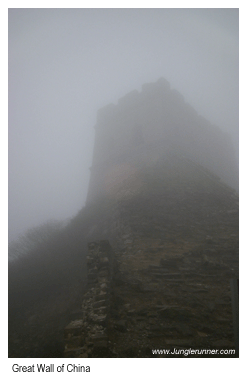 The
nice thing about preconceived notions is they make things really easy.
China is communist therefore it is evil. When you start doing some
digging, read the history, and look behind the propaganda (both eastern
and western) the reality is a bit more complex. Yes the Chinese citizen
loves the communist party for reuniting the country, but also the Chinese
citizen has been oppressed by that same government and wishes for the
same set of freedoms that we hold dear in the west. On one hand the
ethnic Chinese are smart business people and highly motivated to be
successful (witness Hong Kong, Taiwan, Singapore) - but they are also
used to thousands of years of central rule and inbred corruption. It's
a country of contrasts. Superhighways and soiled carpets, an economic
growth rate that is the envy of the world and an environmental record
that is a shame.
The
nice thing about preconceived notions is they make things really easy.
China is communist therefore it is evil. When you start doing some
digging, read the history, and look behind the propaganda (both eastern
and western) the reality is a bit more complex. Yes the Chinese citizen
loves the communist party for reuniting the country, but also the Chinese
citizen has been oppressed by that same government and wishes for the
same set of freedoms that we hold dear in the west. On one hand the
ethnic Chinese are smart business people and highly motivated to be
successful (witness Hong Kong, Taiwan, Singapore) - but they are also
used to thousands of years of central rule and inbred corruption. It's
a country of contrasts. Superhighways and soiled carpets, an economic
growth rate that is the envy of the world and an environmental record
that is a shame.
One thing is clear through. This massive giant has only just decided
to join the rest of the modern world and in a few short decades has
made astounding progress. For those who would be too critical remember
the growing pains of the US half a century ago, progress can be a jerky
affair and it isn't always neat. Viewing the country's progress in
perspective is impressive and you can believe the hype about this emerging
super power - China is definitely for real.
Saturday morning we loaded up the Land Rover and headed north to see
the Great Wall, the first day of a three week odyssey westward across
the length of the country and out Tibet. Wet fog blanketed the mountains
and despite hiking upward for over an hour all we ever saw of the thousand
kilometre rampart were the few feet immediately around us. A pretty
fitting analogy for my own perception of China prior to the trip. I
hope that the next three weeks prove to be more illuminating!


 My
first intimation that China was something different was on the drive
into Beijing after our three day struggle to free the Land Rover from
the port authorities. Highways. Four lane, computerized toll card,
swept median, signs in English highways. Well there was certainly enough
hype in the press about China's booming economy (11% annual growth
for the last decade according to the gov't figures) so they should
be able to afford a couple of highways. But Beijing was yet another
eye opener. Since the city successfully bid for the 2008 Olympics,
coal cooking fires were being replaced with natural gas and the air
quality was pretty decent. Orderly streets, parks, thriving stores,
and plenty of western chain restaurants lent the impression of being
in a European city (though the Chinese signs brought me back to reality
pretty quick). Even so, I was guarded. This was the capitol. Of course
things would be better.
My
first intimation that China was something different was on the drive
into Beijing after our three day struggle to free the Land Rover from
the port authorities. Highways. Four lane, computerized toll card,
swept median, signs in English highways. Well there was certainly enough
hype in the press about China's booming economy (11% annual growth
for the last decade according to the gov't figures) so they should
be able to afford a couple of highways. But Beijing was yet another
eye opener. Since the city successfully bid for the 2008 Olympics,
coal cooking fires were being replaced with natural gas and the air
quality was pretty decent. Orderly streets, parks, thriving stores,
and plenty of western chain restaurants lent the impression of being
in a European city (though the Chinese signs brought me back to reality
pretty quick). Even so, I was guarded. This was the capitol. Of course
things would be better. All
right the children are loved and well educated, 'so what' you may say.
The 'so what' is in population growth, China is 0.88% per year. To
quote professor Pack from school, any country with a population growth
rate above 1% a year has no chance of investing in the infrastructure
necessary to support economic growth, the budget is consumed by healthcare,
education, and housing - that is if there is a decent budget to begin
with. Africa is a prime example. Countries like Kenya with a 3.5% population
growth rate into the '90s (the highest in the world) can't even keep
up with demographic demands never mind infrastructure investment (though
population growth is only one of a myriad of problems that has crippled
Kenya). Take away population control and away go most of the new highways,
pipelines, train tracks, and ports. Think India (1.55% growth rate).
All
right the children are loved and well educated, 'so what' you may say.
The 'so what' is in population growth, China is 0.88% per year. To
quote professor Pack from school, any country with a population growth
rate above 1% a year has no chance of investing in the infrastructure
necessary to support economic growth, the budget is consumed by healthcare,
education, and housing - that is if there is a decent budget to begin
with. Africa is a prime example. Countries like Kenya with a 3.5% population
growth rate into the '90s (the highest in the world) can't even keep
up with demographic demands never mind infrastructure investment (though
population growth is only one of a myriad of problems that has crippled
Kenya). Take away population control and away go most of the new highways,
pipelines, train tracks, and ports. Think India (1.55% growth rate). 70%
Right, 30% Wrong
70%
Right, 30% Wrong Even
the official communist literature admits that Mao made mistakes in
his rule of China, the party line is that he was 70% right and 30%
wrong. I figured out the wrong parts; the purges of intellectuals,
the Great Leap Forward (where Mao forced millions back to the farm
with inspirational slogans to grow food for the country - resulted
in a famine that claimed 30-60 million lives), and the Cultural Revolution
(where thousands of suspected anti-Mao people were imprisoned or killed).
But I was hard pressed to understand why he was still so beloved by
the population. What was the 70% right? To find the answer you must
go back two centuries.
Even
the official communist literature admits that Mao made mistakes in
his rule of China, the party line is that he was 70% right and 30%
wrong. I figured out the wrong parts; the purges of intellectuals,
the Great Leap Forward (where Mao forced millions back to the farm
with inspirational slogans to grow food for the country - resulted
in a famine that claimed 30-60 million lives), and the Cultural Revolution
(where thousands of suspected anti-Mao people were imprisoned or killed).
But I was hard pressed to understand why he was still so beloved by
the population. What was the 70% right? To find the answer you must
go back two centuries.  It
was unfortunate that during this critical time in China's history the
emperors of the Qing Dynasty were of mediocre calibre, and in fact
were completely out of touch with anything happening outside of the
Forbidden City. Most real power was exercised by the eunuchs who surrounded
the emperor, and from 1875 to 1908 the Dowager Empress, Cixi, was the
power behind the throne. She resisted any attempt to reform the ancient
institutions of the empire because she was worried about undermining
her power base, so China was ill-equipped to deal with aggressive western
powers. Gradually China lost it's colonial holdings, Vietnam, Cambodia
and Laos to France, Britain occupied Burma, Japan forced China out
of Korea and made them cede Taiwan, Germany and Russia demanded and
received mineral and railway construction rights.
It
was unfortunate that during this critical time in China's history the
emperors of the Qing Dynasty were of mediocre calibre, and in fact
were completely out of touch with anything happening outside of the
Forbidden City. Most real power was exercised by the eunuchs who surrounded
the emperor, and from 1875 to 1908 the Dowager Empress, Cixi, was the
power behind the throne. She resisted any attempt to reform the ancient
institutions of the empire because she was worried about undermining
her power base, so China was ill-equipped to deal with aggressive western
powers. Gradually China lost it's colonial holdings, Vietnam, Cambodia
and Laos to France, Britain occupied Burma, Japan forced China out
of Korea and made them cede Taiwan, Germany and Russia demanded and
received mineral and railway construction rights.  The
nice thing about preconceived notions is they make things really easy.
China is communist therefore it is evil. When you start doing some
digging, read the history, and look behind the propaganda (both eastern
and western) the reality is a bit more complex. Yes the Chinese citizen
loves the communist party for reuniting the country, but also the Chinese
citizen has been oppressed by that same government and wishes for the
same set of freedoms that we hold dear in the west. On one hand the
ethnic Chinese are smart business people and highly motivated to be
successful (witness Hong Kong, Taiwan, Singapore) - but they are also
used to thousands of years of central rule and inbred corruption. It's
a country of contrasts. Superhighways and soiled carpets, an economic
growth rate that is the envy of the world and an environmental record
that is a shame.
The
nice thing about preconceived notions is they make things really easy.
China is communist therefore it is evil. When you start doing some
digging, read the history, and look behind the propaganda (both eastern
and western) the reality is a bit more complex. Yes the Chinese citizen
loves the communist party for reuniting the country, but also the Chinese
citizen has been oppressed by that same government and wishes for the
same set of freedoms that we hold dear in the west. On one hand the
ethnic Chinese are smart business people and highly motivated to be
successful (witness Hong Kong, Taiwan, Singapore) - but they are also
used to thousands of years of central rule and inbred corruption. It's
a country of contrasts. Superhighways and soiled carpets, an economic
growth rate that is the envy of the world and an environmental record
that is a shame.